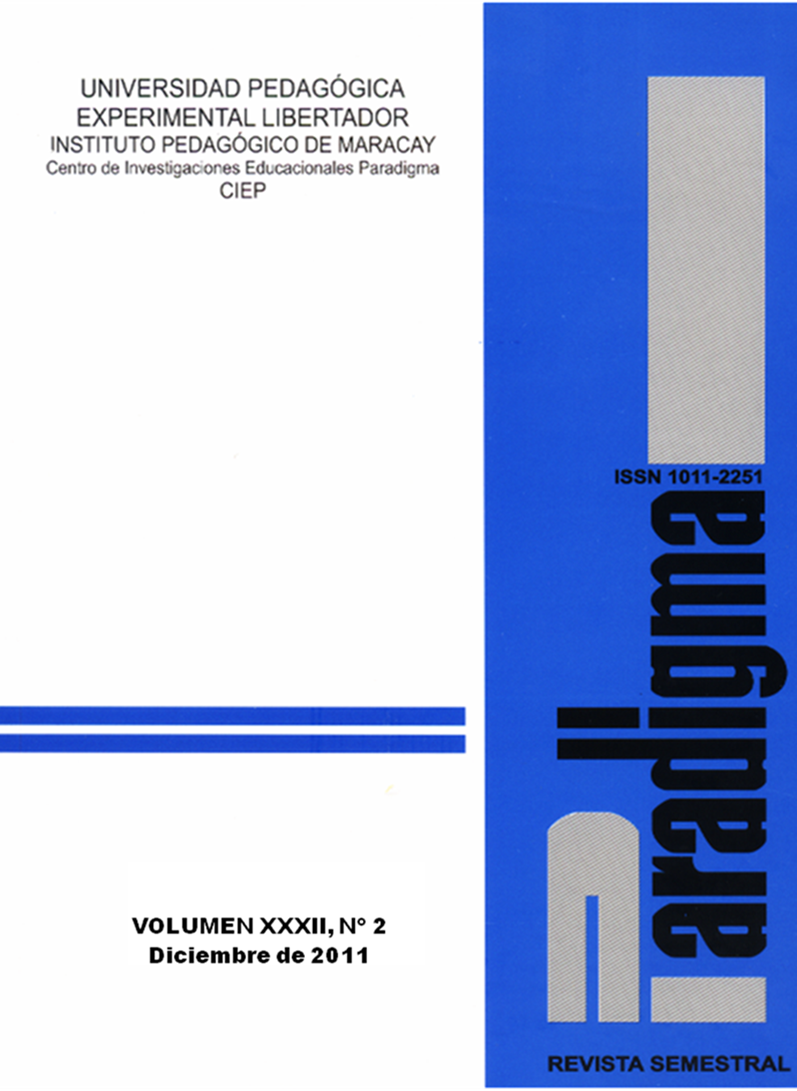LOS BLANCOS EN LA SOCIEDAD COLONIAL VENEZOLANA: REPRESENTACIONES SOCIALES E IDEOLOGÍA
DOI:
10.37618/PARADIGMA.1011-2251.2011.p107-123.id484Resumo
Los libros de texto contienen representaciones sociales acerca de ideologías y valoraciones de los grupos humanos que interactúan en las sociedades. En este sentido, nos proponemos (a) revelar las representaciones sociales acerca de los blancos (peninsulares, criollos o mantuanos y de orilla) presentes en los manuales y libros de texto (sección historia) de primaria del subsistema de Educación Básica; y (b) analizar la manifestación de las ideologías acerca de este grupo de la sociedad colonial venezolana, transmitidas a través de estos materiales educativos. Para ello, nos sustentamos en la teoría de las representaciones sociales (Moscovici, 1979) y en el Análisis Crítico del Discurso (Van Dijk, 1999, 2003a y b). Metodologicamente esta investigación suscribe un estudio documental que examina un corpus de cinco (5) libros de textos de primaria (publicados desde 1995 hasta 2007). Para su análisis, se tomaron notas y se elaboraron diagramas para obtener una descripción detallada de cada uno de los grupos estudiados. .Las conclusiones apuntan la presencia de ideologías y valoraciones racistas en los libros analizados, donde, por un lado, se enfatizan aspectos positivos y se minimizan los negativos de los blancos peninsulares; y, por el otro, se hacen prominentes los negativos de canarios y criollos, al tiempo que se invisibilizan sus atributos positivos. Palabras clave: sociedad colonial venezolana, blancos, representaciones sociales, ideologías.STUDY OF POLYNOMIALS IN CONTEXTABSTRACTThe research aims to describe how to build eighth graders, the concept of a polynomial. Although the study is based on the Cognitive Theory of Advanced Mathematical Thinking (AMT), specifically in the elementary mathematics (Calvo, 2001), there was need for teaching and epistemological analysis from other theoretical frameworks as Socioepistemología, in the absence of a notion resignificar and recover the complexity of the objects studied (Colin, Martinez and Farfán, 2006). Methodologically this research lies in the qualitative paradigm, is descriptive, interpretative and exploratory. To compare and analyse information was analysed didactic, cognitive and epistemological consistent with the framework socioepistemológico. The findings may be summarized as follows: (a) The school used interchangeably discourse the notion of polynomial as a polynomial, polynomial function and expression in a polynomial algebraic (b) The historical study allowed an epistemological approach and the notion arose and evolved in every culture, observing the indiscriminate use of it, as does the school address and (c) the actors understand and assimilate the concept when they transit from arithmetic to algebra in different contexts, giving different meanings to the concept, thus securing a break from their practices algebra arithmetic.Key Words: Polynomial, analysis cognitive, epistemological and didacticDownloads
Não há dados estatísticos.
Downloads
Métricas
Visualizações do artigo: 1625 PDF (Español (España)) downloads: 133
Como Citar
Bohanerges Carrero Mora (UPEL-Maracay,Venezuela), R. (2014). LOS BLANCOS EN LA SOCIEDAD COLONIAL VENEZOLANA: REPRESENTACIONES SOCIALES E IDEOLOGÍA. PARADIGMA, 32(2), 107–123. https://doi.org/10.37618/PARADIGMA.1011-2251.2011.p107-123.id484
Edição
Seção
Artículos


 English
English
 Español (España)
Español (España)
 Français (France)
Français (France)
 Português (Brasil)
Português (Brasil)




















































